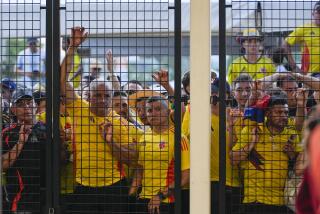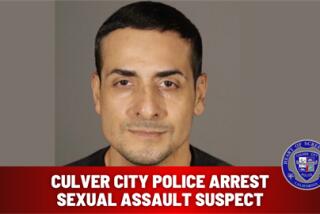Argentina Cries for Maradona : Soccer: His arrest on cocaine charges has transfixed nation’s public attention.
- Share via
BUENOS AIRES, Argentina — Commuters heading downtown from the ritzier suburbs speed past billboards with the smiling face of “Dieguito,” or “Little Diego,” a cartoon figure advertising an Argentine snack that amounts to the nutritional equivalent of a Twinkie.
Just inside the city limits, the traffic slows. Drivers crane to get a look at a nondescript high-rise apartment building, not-so-discreetly guarded by a street full of plainclothes cops. Inside, the man on whom “Dieguito” is modeled -- the man who once owned the Argentine popular soul like no one since Eva Peron -- has been holed up for three days, his image shattered, his future uncertain.
The arrest of soccer great Diego Maradona on cocaine charges Friday has transfixed Argentine public attention, spurring a wide-ranging debate about the nature of celebrity, hero worship and drug abuse.
Reaction has ranged from the clinical to the compassionate to the positively operatic. President Carlos Menem called Maradona “a sick young man” before yanking his designation as Argentina’s “sporting ambassador.” Rowdy fans have gathered at his home to yell, “We love you anyway!” Buenos Aires province governor Antonio Cafiero went on the radio, voice quavering, to urge the 30-year-old Maradona to “come back, Dieguito, and play the game of your life” against drug abuse.
Friends and acquaintances have told how they saw it coming. Doctors have been interviewed at length on methods of treating drug abuse and on how examining a person’s nasal lining can indicate prolonged cocaine use.
A newsmagazine, El Grafico, that claimed to have the lurid inside story of Maradona’s arrest -- it was a Marion Barry-style “sting” operation, the magazine said, complete with a beautiful female undercover agent and a lot of nudity -- sold out this week within minutes of hitting the newsstands.
Federal Police denied the magazine’s claim of a sting, saying the details “do not correspond to reality.”
The only one who has had nothing to say publicly is Maradona himself, the fallen idol. His public is left with sad images -- the tumultuous scene as Maradona was taken into custody and hustled away to be booked, an almost silly grin on his face, soon to be replaced by tearful anguish -- and a remarkable rags-to-riches history that seems to have gone terribly wrong.
Diego Maradona grew up in Villa Fiorito, one of eight children in a family that could be described as lower-middle Argentina, poor and striving, but close and proud.
By the age of 10 he already was a minor celebrity for his remarkable ability to control a soccer ball. A yellowed newspaper clipping from his early teens describes the amazing exhibition he put on during halftime of a professional match. The reporter spelled his name wrong.
Maradona had little formal education beyond grade school. Before he was 17 he was already starring for the professional team Argentinos Juniors and making occasional appearances on the national squad. But he was left off the Argentine team that hosted, played for and won the World Cup in 1978. Maradona has told interviewers that the night he learned he would not be on the 1978 team was one of the most bitter moments of his life.
Maradona switched to another Argentine team, Boca Juniors, known for its rabid fans and its indelible identification with the Argentine working class. It was seen as almost an act of treason when Maradona let himself be seduced by the much higher salaries of the European teams, playing first for Barcelona and finally for Naples. But all was quickly forgiven. Maradona’s career reached its peak in the 1986 World Cup, when he put on a stunning exhibition that led Argentina to the championship.
Diminutive and impish, with a head of black curls, Maradona had star quality. He became one of the world’s best-paid athletes, earning more than $2 million a year from the Naples team, an endorsement contract of more than $4 million from the Puma sportswear company and millions more from other endorsements like “Dieguito” snacks. But things had already begun to go sour.
He was hit with a paternity suit in Italy. He gained weight, and his play suffered. Fans and the media began riding him, and the sweet-natured young man from the wrong side of the tracks began to grow a hard shell.
His 1989 wedding to his longtime sweetheart Claudia Villafane, with whom he already had two daughters, was the social event of the season in Buenos Aires. But its sheer scale and lavishness -- he rented a basketball arena for the reception -- shocked some who had known him for years.
But as far as Argentines were concerned, all was forgiven last year when he captained the national team to an unexpected second-place finish in the World Cup, playing just well enough to make a difference when it mattered.
Several months ago, Maradona’s name surfaced in connection with an investigation of a drug and prostitution ring in Italy. He acknowledged knowing some of the people under suspicion but denied knowing about any “strange links” they might have. Meanwhile, he was openly warring with Naples team officials and his level of play had fallen off sharply.
Maradona gave a hint of things to come last November when he told an interviewer in Italy, “I have vices just like industrialists, businessmen, politicians, journalists and soccer players have vices. ... They say I’m involved in drugs. It’s easy to talk about Maradona in order to hide the problems that so many reporters have. Nobody’s said it to my face, so I’m not going to get into it.”
He began to complain of being tired, disillusioned and ready to pack it in.
“Everything comes to an end sometime, and my career, good or bad, has finished,” he said in February. “It’s time to hang up my boots. Now I’d like to do other things.”
Like an aging heavyweight champion, he kept changing his mind -- one week he was retiring, the next he planned to go on forever. Soccer authorities made up his mind for him when they announced he had failed a regular drug test -- cocaine was found in a urine sample -- and was being suspended.
He came home with the announced intention of settling down to a simpler life. He flirted with the idea of trying to play for an Argentine team, but that idea ended when soccer’s governing body made his suspension official for a period of 15 months. It appeared that he would vacation awhile, live at a slower pace, enjoy his millions and try to keep his endorsement contracts from all vanishing.
Then came Friday afternoon and a bizarre, tragic arrest. Maradona was taken into custody in an apartment in a working-class part of town -- far from the luxurious apartment where he lives with his wife and two daughters -- along with two friends, one of whom he had apparently known since childhood.
Little is known about just how this apartment came under suspicion. Some authorities have said the arrest took place after a lengthy investigation, while others have said it resulted from a recent tip. In any event, reporters were quickly tipped off and dozens were waiting outside after the raid.
When they learned that police were raiding the apartment, the men allegedly threw at least two packets out the window. The packets are believed to contain up to several ounces of cocaine.
The magazine El Grafico, citing unnamed sources, said Maradona went to the apartment in the company of an attractive female agent who had gained his confidence over the past several weeks. Reporters who were at the scene say they saw a woman fitting the description leave the building.
The magazine said Maradona, who appeared to be intoxicated, asked one of the arresting officers if there were not some way out of his predicament. “There’s no turning back,” the officer reportedly said. “There are 200 people outside.”
More to Read
Sign up for Essential California
The most important California stories and recommendations in your inbox every morning.
You may occasionally receive promotional content from the Los Angeles Times.










